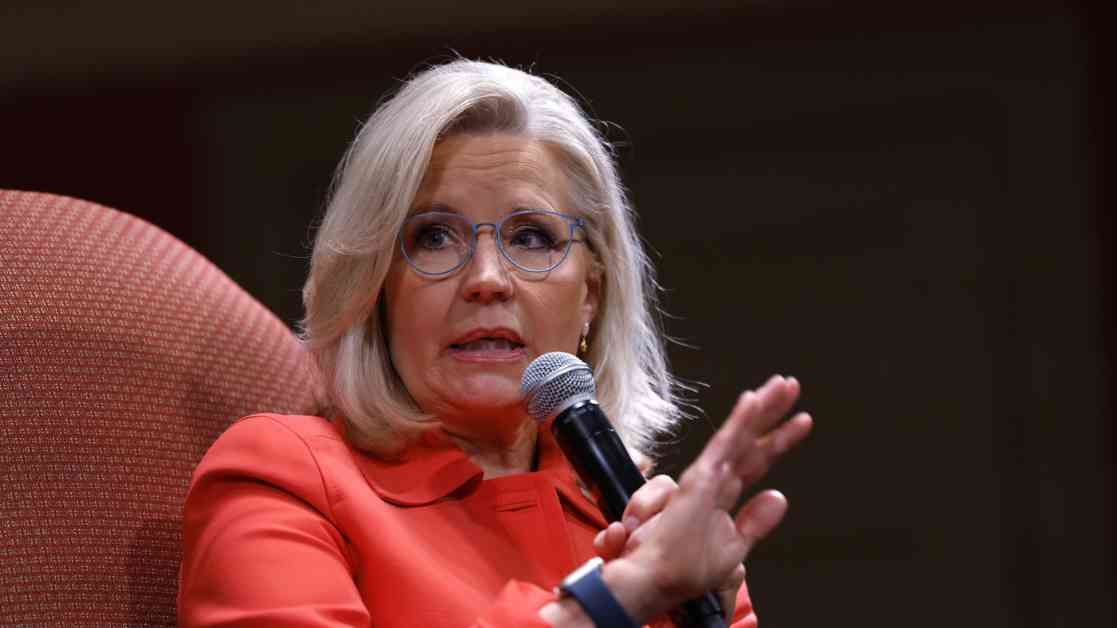Former U.S. Rep. Liz Cheney (R-WY) made headlines recently with her surprising announcement that she will be casting her vote for Vice President Kamala Harris in the upcoming election. This decision marks a significant shift for Cheney, a staunch Republican known for her criticism of former President Donald Trump. Speaking at an event at Duke University, Cheney explained her reasoning behind this historic move, citing the danger she believes Trump poses to the country.
Cheney’s decision to support Harris comes at a time when the Vice President’s campaign is actively reaching out to disenchanted Republican voters. The launch of “Republicans for Harris” and the inclusion of several Republicans at the Democratic National Convention signal a strategic effort to broaden Harris’s appeal across party lines. Cheney’s endorsement adds weight to this campaign strategy, showcasing a growing trend of Republicans willing to break ranks in favor of a candidate they believe aligns with their values.
Throughout her political career, Cheney has been a vocal critic of Trump, particularly in the aftermath of the January 6th attack on the Capitol. She was one of the few Republicans who voted to impeach Trump in 2021 and served on the House committee investigating the events of that day. Cheney’s condemnation of Trump’s actions on January 6th as the “greatest betrayal” by a U.S. president underscores the depth of her opposition to his leadership.
Despite initially supporting Trump in the 2016 and 2020 elections, Cheney’s disillusionment with his presidency grew as she witnessed the fallout from the Capitol insurrection. Her decision to publicly announce her support for Harris reflects a broader trend within the Republican party of individuals reevaluating their allegiance to Trump and seeking alternative candidates who they believe embody the principles they hold dear.
Cheney’s stance has not come without consequences. Her vocal opposition to Trump resulted in her removal from a leadership position within the GOP conference and ultimately led to her defeat in a primary election against a Trump-backed opponent. However, Cheney’s unwavering commitment to putting country over party has earned her respect from both sides of the political aisle and positioned her as a key figure in the ongoing debate within the Republican party.
Cheney’s endorsement of Harris is not an isolated incident. She joins a growing number of Republicans who have publicly stated their intention to support the Vice President, signaling a potential shift in the political landscape as traditional party lines blur. The inclusion of prominent Republicans like Rep. Adam Kinzinger and Olivia Troye in the Democratic National Convention underscores the growing momentum behind the “Republicans for Harris” movement and the broader push for bipartisan collaboration in the face of mounting challenges.
As the election draws near, Cheney’s announcement adds a new dimension to the political discourse, highlighting the complexities and nuances of individual decision-making in a deeply polarized climate. Her willingness to break ranks and support a candidate from across the aisle speaks to a larger narrative of unity and common purpose that transcends party affiliations. In a time of heightened division and discord, Cheney’s bold move serves as a reminder of the power of individual agency and the potential for change through acts of courage and conviction.
Cheney’s Evolution: From Trump Supporter to Harris Advocate
Cheney’s journey from a supporter of Trump to an advocate for Harris reflects a broader transformation within the Republican party as it grapples with its identity and future direction. Her decision to publicly endorse Harris marks a significant departure from her previous alignment with Trump and signals a willingness to prioritize principles over political expediency. This evolution underscores the complexities of navigating a political landscape rife with competing ideologies and shifting allegiances.
The Impact of Cheney’s Endorsement on the Election
Cheney’s endorsement of Harris is poised to have ripple effects throughout the election cycle, influencing voter sentiment and potentially reshaping the electoral landscape. As a respected figure within the Republican party, Cheney’s support for Harris lends credibility to the Vice President’s campaign and may sway undecided voters who are seeking alternatives to the status quo. The symbolic significance of Cheney’s endorsement extends beyond the individual act itself, serving as a catalyst for broader conversations about bipartisanship and the role of cross-party collaboration in advancing national interests.
The Future of Bipartisanship in American Politics
Cheney’s decision to support Harris underscores the need for a more inclusive and collaborative approach to governance in American politics. As the nation grapples with pressing challenges ranging from economic inequality to climate change, the ability of elected officials to transcend partisan divides and work together toward common goals has never been more crucial. Cheney’s endorsement serves as a clarion call for unity and cooperation, challenging entrenched notions of political tribalism and paving the way for a more inclusive and responsive political landscape.
In conclusion, Liz Cheney’s announcement of her support for Vice President Kamala Harris represents a watershed moment in American politics, highlighting the power of individual agency and the potential for meaningful change in a divided nation. As the election approaches, Cheney’s endorsement serves as a reminder of the importance of courage and conviction in standing up for one’s beliefs, even in the face of adversity. Her decision to break ranks and support a candidate from across the aisle underscores the growing momentum behind efforts to bridge partisan divides and foster a more collaborative approach to governance. As the political landscape continues to evolve, Cheney’s endorsement stands as a beacon of hope for a more united and inclusive future for the United States.



























